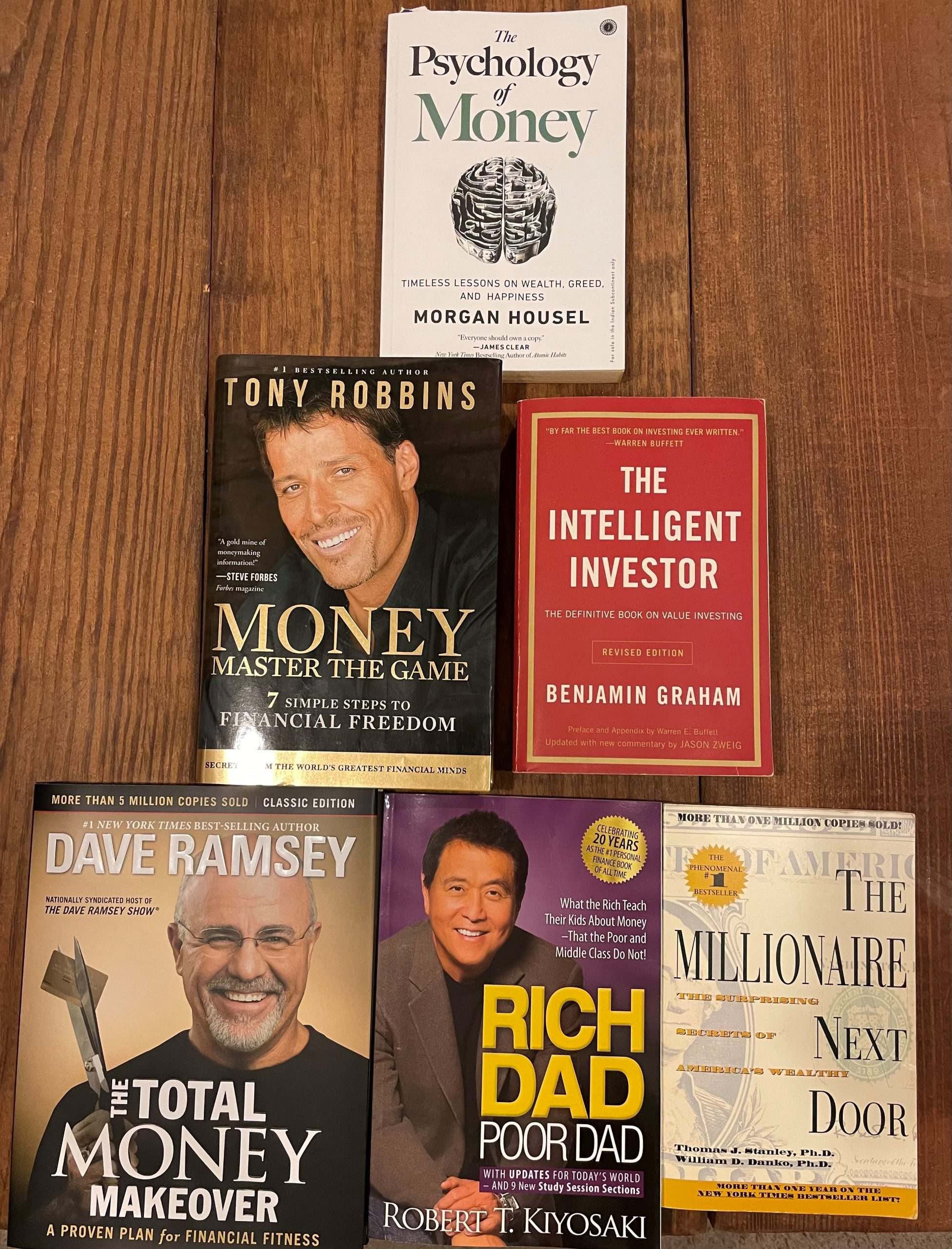Books about money can offer invaluable insights into the complex world of finance, providing readers with a deeper understanding of how the economy operates and personal finance can be managed more effectively. From best books on money management to engaging finance books recommendations, these literary resources are essential for anyone looking to enhance their financial literacy. Renowned economists have penned various top economics books, exploring themes from the history of currency to the future of digital money. By engaging with such texts, readers not only learn about money and economy, they also develop critical skills necessary for navigating today’s financial landscape. Whether you’re a novice or an expert, diving into these books could significantly impact your relationship with money and your economic well-being.
Literature centered on finances encompasses a broad spectrum of topics, delving into the intricacies of economic principles and the ways individuals can achieve financial stability and growth. Such works, often categorized under financial education material or personal finance guides, bring clarity to the concepts that can sometimes seem daunting and overwhelming. This genre includes resources on money principles, investment strategies, and even historical analyses of financial systems. By exploring these titles, readers can empower themselves with knowledge and strategies that enhance their decision-making abilities related to investments and money management. Understanding the nuances of finance is crucial in today’s world, as it provides a foundation for making informed choices that can lead to significant financial success.
Understanding Money Through Meaningful Literature
Books about money have a unique ability to transform how we view and interact with this crucial part of our lives. Works like “Money” by Jacob Goldstein and “Money Mischief” by Milton Friedman delve into the essence of what money is and its evolution through history. They provide an entertaining yet informative perspective that challenges readers to rethink their understanding of economics, finance, and the impact of money on society as a whole. Such financial literacy books are essential for anyone looking to build a solid foundation on monetary concepts that influence our daily decisions.
Moreover, these texts often weave in historical context, like in Niall Ferguson’s “The Ascent of Money,” which captures the intricacies of debt and finance throughout various civilizations. This novel approach not only educates but also engages readers, making complex economic topics more relatable and easier to grasp. Understanding the historical significance and the fluctuating role of money in different eras enhances our awareness of today’s financial systems and policies, ultimately guiding us toward better money management practices.
Top Economics Books for Financial Literacy
For those seeking to deepen their knowledge of economics, a great starting point includes the recommendations of esteemed economists. Books like “The Future of Money” by Eswar S. Prasad outline the past, present, and future implications of cryptocurrencies, shedding light on emerging financial technologies. Such top economics books emphasize the need for adaptability in our financial strategies as digital currencies redefine traditional concepts of money, making them vital for financial literacy.
In addition to cryptocurrency discussions, texts such as “The Price of Peace” by Zachary D. Carter explore the broader economic implications of monetary policy and its intersection with significant historical events, including war and peace. These insights empower readers and investors alike to forge a more comprehensive understanding of how economics shapes the world around them, encouraging informed decisions and responsible money management that will resonate through generations.
The Intersection of Finance and Society
Books that discuss money also highlight its social implications and influence on human behavior. For instance, “Ben Franklin: An American Life” by Walter Isaacson portrays how Franklin’s innovations in paper currency reflected his forward-thinking mindset. Such narratives illustrate how finance is not just about numbers but deeply intertwined with societal advancement and cultural evolution. Recognizing this connection can enhance our appreciation for financial literacy books, showing how they are not merely academic but pivotal to understanding societal progress.
Furthermore, works like “The Curse of Cash” by Kenneth S. Rogoff discuss the complex relationship between government regulation and innovation in financial transactions. As cash dealings evolve, understanding how various stakeholders—governments, economists, and the public—interact becomes essential. These perspectives shed light on the ongoing debates surrounding money, preparing readers to navigate the intricacies of economic policies and their societal consequences.
Essential Readings on Money Management
Effective money management is a critical skill for personal financial success, and several insightful books can enhance our abilities in this area. Classics like “The Only Game in Town” by Mohamed A. El-Erian explore the role of central banking in shaping economic landscapes, offering valuable lessons for individuals navigating their financial lives. Understanding these principles allows readers to adopt a more prudent approach to their finances, fostering confidence when making investments and managing expenses.
Additionally, nurturing a solid understanding of financial strategies through resources like “Career and Family” by Claudia Goldin highlights the socio-economic factors that influence financial decision-making, especially among women balancing career aspirations with personal life. These insights position readers to not only manage their money effectively but also create financial plans that align with their life goals, illustrating the multifaceted nature of money management.
Historical Perspectives on Economics and Money
Exploring books that delve into historical perspectives on money can provide profound insights into current economic systems. “The Forgotten Financiers of the Louisiana Purchase” by Larry Neal is a perfect example, revealing how historical economic events have shaped our understanding of finance today. This kind of history-centric analysis allows readers to understand the foundations of modern banking and finance, enabling them to apply these lessons to contemporary economic scenarios.
Furthermore, understanding the evolution of monetary systems—as described in “The Ascent of Money”—highlights how past financial innovations inform present-day practices. By studying these historical frameworks, readers can better appreciate current economic challenges, preparing them to respond more effectively to future changes in the financial landscape, and thereby reinforcing their financial literacy and investment strategies.
Economic Insights From Top Scholars
Reading books by leading economists can provide unique insights into the complexities of finance and its impact on the economy. For instance, Claudia Goldin’s work not only discusses economic challenges faced by women but also examines broader trends affecting the labor market. By integrating gender perspectives into economic discussions, her research contributes to a more inclusive understanding of money and its societal implications, a critical aspect of effective financial literacy.
Similarly, the works of other economists featured in various recommended reading lists, such as Kenneth S. Rogoff’s analyses on cash and cryptocurrency, help readers grasp the nuances of today’s economic debates. Engaging with these scholarly perspectives equips readers with the tools needed to make informed decisions in their personal and professional financial endeavors, reinforcing the relevance of ongoing economic education.
Impact of Finance on Decision Making
The interplay between finance and decision-making is a theme that runs throughout many books about money. Understanding how economic policies influence individual choices can lead to more strategic financial planning. For example, insights from “The Future of Money” encourage readers to consider how the rise of digital currencies and changes in central bank policies affect their spending and saving habits, ultimately reshaping their financial futures.
Exploring the psychological components of financial decision-making can be equally enlightening. Economists emphasize that human behavior, biases, and cultural contexts play critical roles in our financial choices. By combining knowledge from books focused on behavioral finance with traditional economic texts, individuals can develop a more holistic approach to their finances, empowering them to improve their financial literacy and make proactive money management decisions.
Finance and Technology: A Changing Landscape
The intersection of finance and technology is rapidly evolving, making contemporary books vital for those looking to stay informed. Titles like “Money Mischief” not only explore historical aspects of finance but also delve into how innovations like cryptocurrency are redefining banking and fiscal policy. By understanding these technological advancements, individuals can adapt their financial practices to align with the ongoing digital transformation in the economy.
As technology continues to reshape how we handle money, understanding the implications of fintech innovations is crucial. Readers must educate themselves on the tools and platforms available for managing their finances, investing, and even seeking advice. Engaging with literature that addresses these technologies supports a proactive approach to financial management, ensuring that individuals remain competent in navigating today’s complex financial environment.
Books to Challenge Conventional Economic Wisdom
Challenging traditional economic thinking can often lead to a deeper understanding of money and finance. Books such as “The Curse of Cash” provide critical analyses of conventional monetary practices and propose alternative viewpoints that provoke thoughtful discussion. By engaging with these perspectives, readers can question the status quo and explore innovative solutions to persistent economic issues.
Moreover, embracing diverse opinions in economic literature can enhance one’s understanding of the multifaceted nature of finance. Reading disciplines that critique mainstream economics empowers individuals to cultivate critical thinking skills essential for informed decision-making. This approach not only bolsters personal financial management practices but also encourages broader engagement in economic discourse, fostering a community of financially literate individuals.
Frequently Asked Questions
What are the best money management books for financial literacy?
When it comes to improving financial literacy, several books stand out. Titles such as ‘The Total Money Makeover’ by Dave Ramsey focus on budgeting and debt elimination, while ‘Rich Dad Poor Dad’ by Robert Kiyosaki elaborates on the mindset shift necessary for effective money management. For those looking for comprehensive guides, ‘The Intelligent Investor’ by Benjamin Graham provides timeless investment strategies that are crucial for anyone keen on mastering their finances.
What are top finance book recommendations for understanding money and economy?
For a deeper understanding of money and economy, consider reading ‘Money: The True Story of a Made-Up Thing’ by Jacob Goldstein, which offers an engaging history of currency. Another excellent choice is ‘The Ascent of Money’ by Niall Ferguson, which traces the evolution of finance throughout history. These books provide significant insights into how money influences economies and societies.
Which books about money are recommended for learning about economics?
If you’re interested in economics through the lens of money, ‘The Future of Money’ by Eswar S. Prasad explores the implications of cryptocurrencies and central banking. Additionally, ‘The Price of Peace’ by Zachary D. Carter delves into John Maynard Keynes’ perspectives on economics, making it a must-read for anyone wanting to connect money concepts with broader economic theories.
What are some essential finance books for beginners?
Beginner finance books should include ‘The Millionaire Next Door’ by Thomas J. Stanley and William D. Danko, which provides insights into wealth-building habits. ‘Your Money or Your Life’ by Vicki Robin and Joe Dominguez is another excellent choice that teaches individuals how to achieve financial independence through mindful spending. These foundational texts lay the groundwork for understanding money management.
How can books about money improve financial literacy?
Books about money play a crucial role in enhancing financial literacy by providing essential information on budgeting, investing, and economic principles. They equip readers with the knowledge to make informed decisions about their finances, understand economic systems, and build effective money management strategies. Titles like ‘The Simple Path to Wealth’ by JL Collins offer straightforward advice that can lead to significant financial empowerment.
What are the best books on money for understanding cryptocurrencies?
To gain insights into cryptocurrencies, ‘The Future of Money’ by Eswar S. Prasad is a top pick, providing a balanced view on digital currencies and their impact on the economy. Additionally, ‘Bitcoin: Hard Money You Can’t F**k With’ by the pseudonymous author Mike J. Casey explains Bitcoin’s value proposition and its potential to revolutionize finance, making it a perfect start for beginners interested in this innovative space.
Which finance books focus on the history of money?
For a historical perspective on money, ‘The Ascent of Money’ by Niall Ferguson offers an engaging narrative encompassing the evolution of finance from ancient times to today. Similarly, ‘Money Mischief’ by Milton Friedman gives readers context about how monetary policy and historical events have shaped contemporary economies. Both books illuminate the complexities surrounding the development of money.
Are there any essential books about financial literacy for women?
Yes, books like ‘Career and Family’ by Claudia Goldin address the economic factors influencing women’s career paths and family life, making them essential for understanding the financial challenges women face. Additionally, ‘Girl, Stop Apologizing’ by Rachel Hollis encourages women to pursue their financial goals confidently, helping to boost their financial literacy and independence.
| Author | Book Title | Description |
|---|---|---|
| Jason Furman | Money | An entertaining history of what money is — and what aspired to be money but turned out not to be. |
| Jason Furman | The Future of Money | The most reliable economic account of cryptocurrencies and central bank digital currencies. |
| Jason Furman | Money Mischief | A scholarly yet entertaining exploration of monetarism. |
| Jason Furman | The Price of Peace | A biography of Keynes with insights on money’s impact on the economy and politics. |
| Kenneth S. Rogoff | The Ascent of Money | A historical narrative of finance and debt from ancient times to today. |
| Kenneth S. Rogoff | The Only Game in Town | An examination of central banking’s role in the post-financial crisis era. |
| Kenneth S. Rogoff | Ben Franklin: An American Life | A depiction of Franklin’s innovative contributions to currency and finance. |
| Kenneth S. Rogoff | The Curse of Cash | Exploration of the past, present, and future of money and government regulation. |
| Claudia Goldin | The Forgotten Financiers of the Louisiana Purchase | Investigative narrative on the financing of the Louisiana Purchase. |
| Claudia Goldin | Career and Family | Analysis of women’s balance of career and family over 120 years. |
Summary
Books about money provide invaluable insights into financial matters that affect both individuals and society at large. The recommended titles by Harvard economists shed light on historical, economic, and personal perspectives on money, emphasizing its multifaceted role in our lives. By exploring these works, readers can gain a deeper understanding of the complexities surrounding money, from its origins and evolution to its modern implications in our digital age.


